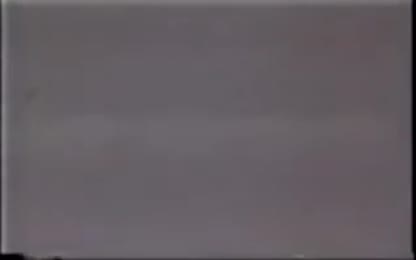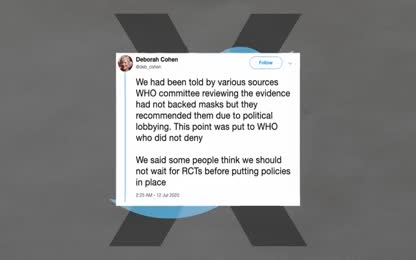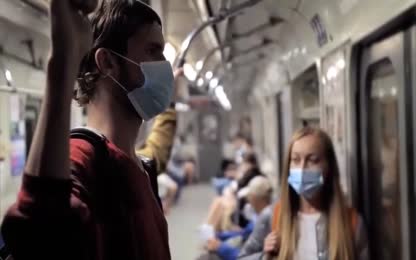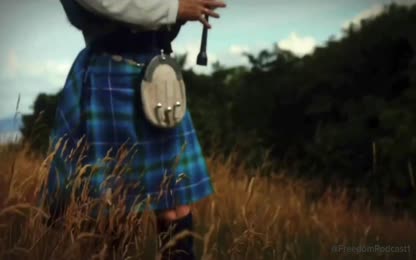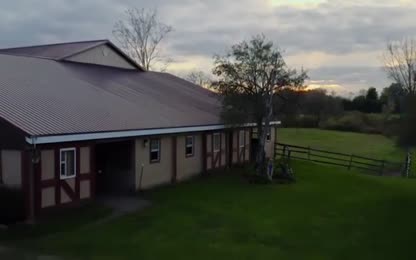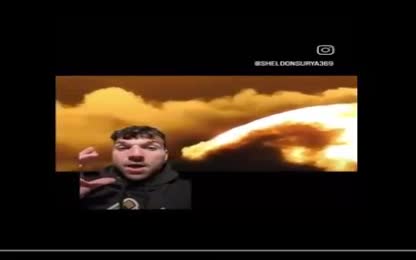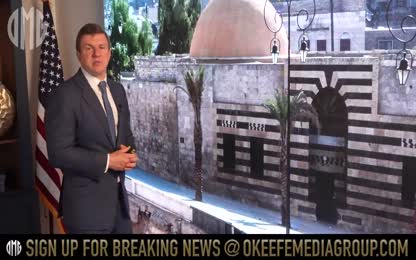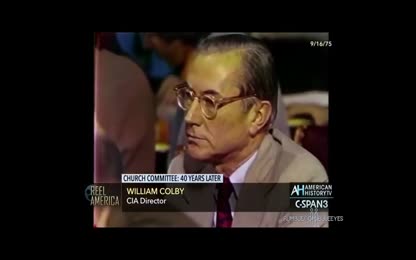Advertisement
INSIDE THE BROTHERHOOD 1 (Documentary) 1_6
INSIDE THE BROTHERHOOD (Documentary) 1_6
- Category: Uncategorized,Conspiracies / A secret plan ,NWO / New World Order,Secret Society / Secret Cabal
- Duration: 25:04
- Date: 2017-12-15 23:00:04
- Tags: masons, freemasons, illuminati
1 Comments
Video Transcript:
You These men are free masons. Members of a worldwide fraternity, which unites working men in small towns with men of rank and opulence occupying the highest seats of power. Once public Masonic parades were commonplace, but this annual march by the masons of Melrose in Scotland is probably the last in Britain. The march honors the stone masons who built Melrose Abbey and gives local free masons a chance to parade their new lodged master around the town. But Britain's other 9,000 lodges meet behind closed doors and the identity of most of Britain's half a million masons is a closely guarded secret. It's estimated that of 135,000 serving policemen in Britain, 22,000 or one in six are free masons. Most masons say there is no conflict of interest between police work and membership of the brotherhood, but some outsiders disagree. What is certain, and I've seen the evidence for it and other people have seen it, that there are lists of lodges which include active criminals and serving policemen in the same lodge and that can never be right. Critics also worry that masons are concentrated in many other powerful institutions, notably the law. Confidential Masonic documents reveal that hundreds of magistrates, at least 18 circuit judges, four Queen's bench judges, three family division judges, two judges in chanceary, three law justices of appeal and one law of appeal are masons. But it's in the city of London that the greatest concentration of masons is found. For Britain's richest square mile, there are hundreds of Masonic lodges in which brothers from the great banks and insurance houses, the stock exchange and all the other money markets meet in secret. Here at the Guild Hall, from which the city is governed, masons gather in the crypt for a meeting of the Guild Hall lodge. A past lodge master, Sir Kenneth Cork, is handed the briefcase containing his ceremonial apron by his chauffeur. The head of one of the city's most successful accountancy firms, specializing in company liquidations and bankruptcies, Sir Kenneth is also a former Lord Mayor of London. Since 1970, Lord Mayor's have been masters of Guild Hall lodge, evidence of the highest team in which masons are held in Britain's traditional institutions. But how other masons use the brotherhood for corrupt ends, as even some masons claim. I think that people use free masonry or for the wrong purposes. They use it as a way to get on to improve their position, to get promotion and corrupt people, use it to carry out their corrupt corruption in a secret manner, with very little chance of being court. Brother Junior Warden, there is a report. Tonight, in the first of six programs on the brotherhood's power and influence, we investigate the secret ceremonial rituals of the ancient fraternity of free and accepted masons, and show how its members have ranged from the highest to the lowest in British society, from kings to convicts. Who are you there? Mr Martin, a poor candidate in the state of darkness. Filming the mysteries of free masonry is forbidden. So, using masonic handbooks and helped by master masons, we have reconstructed the brotherhood's rituals. Tonight, thousands of men all over Britain are performing these mystic rights. Worshipful master, Mr Martin, a poor candidate in the state of darkness who has been well and worthily recommended. There are three degrees of initiation into basic craft free masonry. This is the first degree ritual in which the candidate seeks to become an apprentice mason. Do you, brother inner guard, vouch that he has been properly prepared? I do, worshipful master. Then let him be admitted in due form. Brother Degan's. Do you feel anything? Yes. Women are not allowed to become masons, and some interpretations of the ritual say that candidates left breast is exposed to prove that he is not a woman. His trouser leg is rolled up to show that he's able bodied, and he is blindfolded because he is in a state of darkness seeking light. To non-masons, these rituals might seem a strange pastime for grown men to indulge in. But psychologist Jane Furbank, who studied male bonding, believes that free masonry may satisfy a deeper need than other all male groups. That's assured. I will thank you to Neil, while the blessing of heaven is invoked on our proceedings. On the purely practical level, it has the same leaders joining the local Chamber of Commerce, the Gulf Club and all the rest. But it does also give you what's called a right of passage. It takes you in from being adolescent, or from being what's technically called a peripheral male, one on the outside. It brings you into the centre, into the heart, where the power and the influence is. That power and influence knows few bounds. The Palace of Westminster houses one of English masonry's best kept secrets. The existence of two lodges reserved for men who work in Parliament. One of these, the gallery lodge, was founded 100 years ago by pressmen and lobby correspondents. The other was created at the suggestion of the Prince of Wales, later King Edward VIII, an art and mason. In the 1920s, he was upset to learn, Labour politicians were being black-bowl when proposed as members of Masonic lodges. The craft stood to be condemned as the Tory party in aprons, and when Labour looked set to become the party of government, masonry was in danger of losing all influence over Britain's future. The Prince suggested a new lodge to welcome Labour MPs and so draw them into both masonry and the middle ground of British politics. The aptly named new welcome lodge was consecrated in 1929, and today it contains 20 past and present MPs from all leading parties. Yet it must tread a careful path if it's not to break one of the brotherhoods loudly proclaimed rules. Your obedience must be proved by a strict observance of our laws and regulations, by abstaining from every topic of political and religious discussion. Despite this injunction against discussing politics within the lodge, there is no rule against Mason's interfering in politics outside the lodge. In 1935, Mason's played a crucial role in the election of a new leader of the Labour Party. Clement Attlee and one of his rivals for the leadership Arthur Greenwood were Mason's, but a third candidate Herbert Morrison was not. In an interview filmed in 1965, but not broadcast, Morrison reflects on Freemasonry's damaging effect on his career. Somebody who I do not know anonymously sent me a copy of a notice convening a Freemason's lodge meeting. A few days, ending up to a week, I forget the exact lapse of time, before this meeting of the Parliamentary Party decided upon the leadership. And the anonymous writer suggested that the meeting of the Freemason's lodge was to win support for Mr Arthur Greenwood, who was known to be a Freelim Mason, and in fact was a very important officer of this lodge. Yet as Freemason Robert Burns perhaps meant to say, even the best laid plans of Mason men can fail. Greenwood came third in the first ballot and was eliminated. In the runoff, the Mason's switched their vote to Brother Attlee. This ensured the defeat of the non-Mason Morrison. So despite Freemasonry's claim never to interfere in politics, it seems the Brotherhood had a direct influence on one of the most important British political decisions this century. The other country is ready. Worshipful Brother Attlee went on to become Prime Minister in 1945 and stayed Labour leader until 1955. Today, British Mason still occupy positions of political power. At least two cabinet ministers are members of the Brotherhood. Cecil Parkinson belongs to the Royal Atholsonan lodge and the Pottersbar lodge which meets in his constituency. And Lord Belsed belongs to the exclusive Kaiser Ehendlodge. He became leader of the House of Lords in 1988, succeeding another Mason, Fykehont Whitelaw, who had been Mrs. Thatcher's Deputy Prime Minister. Former Health Minister Segerard Vaughn and Backbentcher Neil Thorn are both grand officers of English Freemasonry. Many other MPs are Masons, including Cecil Walker, Oster Unionist, Sir William Clark, Antony Nelson, Peter Rost, Tony Baldry, David Sumburg and Gary Waller, all conservatives. Another Mason is the former MP and Solicitor General Sir Ian Percival, who says it's inconceivable that Masons would interfere in politics. If anybody tried it, not only would they not succeed, but they wouldn't get as much as they would have caught without doing it if you know what I mean. I mean, they would be blacklisted and not only by the rest of the House, they'd be blacklisted by the Mason's in the House because we don't want that reputation. And if anybody tried it, I'd tell you we're very stern about it. But some non-Mason MPs remain uneasy about the existence of a parliamentary lodge. It's bringing together a subgroup within the House for various covert purposes from which the rest of us are excluded. Therefore, in a representative institution, it must, if so, factor will be undesirable. Freemasons' hall London, headquarters of the English craft. One man in every 30 in England and Wales is a Mason. In Scotland and Northern Ireland, the ratio is even higher. Their leaders always come from the top of the social pyramid. This century, three kings have been Masons. The Queen's father, George VI, was in the Navy lodge. So was Prince Philip, but he quit many years ago. Today, England's chief Mason is the Queen's cousin, the Worshipful Grandmaster, the Duke of Kent. As part of a new policy of openness, England's other Masonic bosses were filmed for the first time in 1988. The pro-Grandmaster is Lord Cornwallis, third Baron of Linton, a farmer and businessman. The assistant Grandmaster is Lord Farnham, a merchant banker. And the deputy Grandmaster is the Honourable Edward Balew, a retired stockbroker. Although many Mason's are from what used to be called the working class, most are from the middle and upper classes. Professional men, lawyers, doctors, army officers, bank managers and self-employed businessmen. Show business personalities like Alfred Marx, Mike Reed and Bob Monkhaus are also on the square. All these men have been put through the ritual humiliation inflicted at each of the brotherhoods first three degrees. They are therefore sworn to uphold three principles, brotherhood, relief or charity and truth. But alongside these worthy principles, the brotherhood has many disquieting features. Its membership is largely secret. The brothers have secret ways of making themselves known to each other, and they have sworn secret oles of mutual aid. These are all hallmarks of a secret society. Yet English Masonry's Grand Secretary, Michael Hyam, rejects any sinister interpretation of the order's secrecy. We've got secrets, secrets which derive from the old days when they were recognition signals between craftsmen protecting their trade secrets. And we still use them now as a link with the past, but we're absolutely not a secret society. Nevertheless, among the public, the fear persists that there may be more to the secrets than harmless ritual. And when cameras were invited to film in Grand Lodge for the first time, not everything would be open for scrutiny. Journalist Paul Foot has long campaigned against what he sees as Freemasonry's sinister power. Do all the ready to receive the most wonderful program now, sir? It's the secrecy of the association and the bonds that they tie each other up with, which is the sinister aspect of it. The secret society is the secret society. Most of the other organisations which bring together important people in the community, I mean the rotary club or the round table or organisations of like that, they can be discovered if you like by someone like me or you. I find out who's the chairman of the round table or who's the chairman of the rotary club and they throw their meetings out into the public and the press, mingle with them and so on. Freemasonry, they mingle in secret. Are you therefore willing to take a solemn obligation founded on the principles I have stated to keep in violet the secrets and mysteries of the order? I am. Then you will kneel on your left knee. Your right foot formed in a square. Give me your right hand, which I place on the volume of the sacred law. While you're left, will support these compasses. One point presented to your naked left breast. The impressionable apprentice Freemason undergoes a bizarre and powerful bonding. Nevertheless, many senior masons dismiss concern about secret Masonic influence as an orchestrated campaign against the brotherhood. I think there is a small bell with a body of people who for reasons that I didn't understand. Not in not friendly, they are downright hostile. And the activists usually the ones who feels get hurt most and they've been making quite a noise. In 1988, in an attempt to confront growing public suspicion, the Freemasons produced a glossy video. The Spire of Salis Brick a Theedral, 250 feet of soaring stone, rising above the water meddels of the Wiltshire Aven. The traveling stone masons who built the great cathedrals of medieval Europe formed their own associations apart from the rest of the medieval gold system. For all its apparent openness, the commercially produced video is a careful exercise in concealment. Even the legend that modern Freemasons are descended from medieval stone workers is left virtually intact. But there is little historical evidence with this as Masonic historian John Hamill confirms. When people were first starting to put Masonic histories together, the tradition grew up. That we grew directly out of the stone masons and traditions die very hard particularly in this country. And it's taken a lot of time to break that down and say, well, that's fine, it's a nice story. But is the evidence there for it? Most evidence indicates that ritualistic Freemasonry was started much later in 17th century Britain. Not by stone masons, but by middle class gentleman. The movement soon caught on. It was a period of great religious and political turmoil when differences of opinion on religion and politics not only split families but led to the civil war in this country and to bloodshed and rather fighting brother. And we believe that the people who started Freemasonry were a group of people who wanted to have some sort of forum where they could meet without the differences of religion and politics coming into it. The dangers you have escaped are those of stabbing and strangling. For on your entrance to the lodge, this ponyard was presented to your naked left breast to imply that had you rashly attempted to rush forward, you would have been accessory to your own death by stabbing. The blood-curdling rituals of Freemasonry today were invented in the early 18th century. At that time of religious and political persecution, a fearsome oath of secrecy may have seemed essential, but can the same be true today? Equally fatal. But the danger, which traditionally would have awaited you until your later star, was the physical penalty, a one-time associated with the obligation of a Mason, that of having your throat cut across. How do you improperly disclose the secrets of Masonry? According to their own video, today's masons steadfastly keep the secrets of the rituals for innocent, if masochistic reasons. You will lose all the missteem, if you knew what was going through, the fear, for example. If I knew what was going to happen, I don't think I'd have the same pleasure. Earlier this century, hundreds of Protestant clergy were masons. The craft was an unquestioned pillar of society and bishops, even archbishops, felt its rituals supported religion. But growing unease provoked a church of England inquiry, which reported in 1986 that elements of Freemasonry are incompatible with Christianity, even blasphemous. Today, many Anglican priests share the Catholic view that Masonry's offer of spiritual light is not just unacceptable. They think it's a satanic fraud. Well-meaning people, good, honest, upright people, are being deceived, and the Bible teaches us that there's one source of the deceiver who is described as the devil Satan. And I think underneath it all, it is a deception. It purports to be light, but it's in fact darkness. Freemasonry stresses it is not a religion, only that its members must be male, over 21, and believe in a god, any god. Freemasons of different faiths pray together to a supreme being who is referred to as the Great Architect of the Universe. We ask Jane Furbank as a psychologist and a woman for her thoughts on the Great Architect. Well, this is obviously a biased point of view, but he sounds to me rather a masculine sort of god. There seems to be very little talk about the more spiritual side, or what you might describe as the more feminine side of religion. There's no Freemason equivalent of the Virgin Mary, for example. This god requires you to stand up straight to make certain very precise gestures, you know, to talk a great deal about being straight, unlevel, and square, not round, you notice, but square. If you look at the psychology of symbols, you'll find roundness is the mind, the spirit, its wholeness, and squareness is much more order, material, physical world. So why do men continue to join Freemasonry in the face of suspicion, even outright condemnation? It's difficult for outsiders not to think that self-interest and career considerations must play a part. Certainly the view persists that the code of mutual aid in the ritual can lead to brother-masons combining to the detriment of non-masons. Those Masonic bonds of preferment seem to apply in unlikely places. Ext Detective Sergeant John Simon's was a Freemason when he was in the Metropolitan Police. Later he went to prison, convicted of soliciting a bribe. Freemasonry's life in prison. I'm saying I spent some time in an open prison where I witnessed, you know, contacts between Masonic prisoners and Masonic prisoners and Masonic prisoners were getting special visits and having parcels left by the gate and all this sort of business. But Masonic prisoners may enjoy more than special privileges. Informal lodge meetings are held in Britain's jails, as one bemused inmate discovered. I go to the meeting and there is the chaplain on the deputy, a vicar from outside, two prison officers, two or three prison officers and maybe half a dozen prisoners. T. Dan Smith, one time boss of Newcastle City Council, had been sentenced to six years jail in 1976 for corruption. He was not a Freemason. I just didn't know what the hell I'd put myself into. And within minutes they, I mean obviously they knew that I didn't know what I was doing there and that I wasn't a Mason. And consequently they were considerable annoyance, the chaplain of all people said, oh, you know, this is outrageous, what a wide and nothing. And of course I was out in two seconds from that. But by then of course I knew what the score was. Contrary to many Mason's belief, nothing in their vows forbids them telling outsiders that they are Mason's. Yet as long as most refuse to admit membership, they will encounter suspicion that they use Masonry to combine clandestinely and to scratch each other's backs. I don't mind mutual sustenance and certainly I positively like a charitable organizations which provide a service. And many of the largest, much of Freemasonry does that and concentrates on that. It's when it becomes something more than that. Not only it means of serving the community, but of serving themselves that it becomes worrying. Gary Bull. This concern about the brotherhood has recently been reflected nationwide. In the last five years, in response to local allegations of Masonic-Skelduggery, councils from Liverpool and Manchester to Worthing and South End have expressed grave misgivings about Freemasonry. Questions have been asked in Parliament and police committees up and down the country have debated Masonic influence within the police force. Okay, I'd like to welcome everybody to this meeting of the Eastern Police Community Consultative Group. During the next five weeks, this series will investigate public concern about the brotherhood. Freemasons claim to occupy higher moral ground than non-Musonic outsiders, but a constant flow of allegations suggest that Freemasonry may be a perfect vehicle for corruption, corruption in law enforcement, in local government and in business. Overseas, it has even been used to subvert democracy. Next week we investigate the unacceptable convergence of Freemasonry and corruption in Britain's police forces.









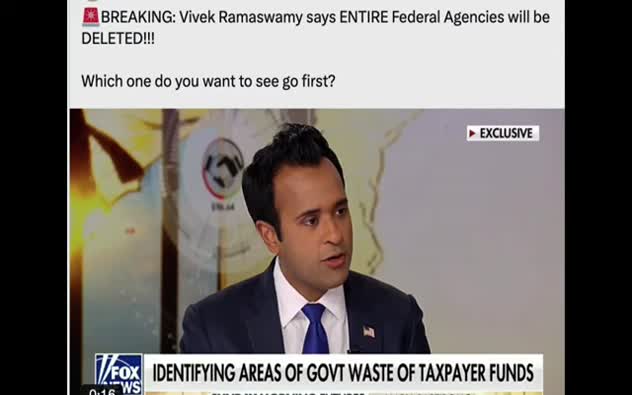
 Donate
Donate